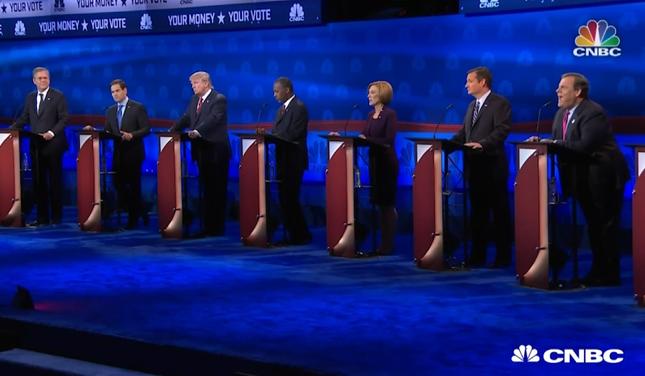GOP Debaters Win by Hitting the Mainstream Media
By • November 9, 2015 0 658

Most observers agreed that Hillary Clinton, as well as the Democratic Party at large had a pretty good week in the aftermath of the Democratic candidates’ debate, which was considered largely a) a triumph for Clinton and b) a measured substantive debate with few moments of outright verbal combat, or horrors of horrors, name calling. And Clinton topped that by emerging pretty much unscathed from a grueling 11 hours plus of testimony before a Republican controlled and loaded-for-bear House select committee on the 2012 Benghazi attack as well as her e-mail account while she was secretary of state.
It was the Republicans’ turn again this week and you could make an argument—and they did—that they had a fairly good day and night of it.
The CNBC-hosted GOP debate in Boulder, Colorado, took place Oct. 28 against a framework of relative triumph for some Republicans and the party—the very same day representative and avowed economics whiz Paul Ryan was elected Speaker of the House of Representatives. That vote appeared for a while apparently almost against his wishes—like a prom queen who can’t stand going to parties. The election of Ryan staved off another big budget fight, as the House passed a budget deals which more than likely staved off a government shutdown, but not another intra-party debate among Republicans.
With that disunity and gridlock averted—the Congress actually passed something—the remaining GOP candidates headed into Boulder with the media and political strategists wondering how Donald Trump, who had led the polls since whenever this year, would react being relegated to runner up, behind the quiet brain surgeon—or how the same Ben Carson might make use of his newfound front runner status.
Turned out it didn’t matter much: Trump was muted throughout as was Carson, a not unusual state for him, who has been praised for his quiet and modest manner. In terms of the campaign so far, the two were an unmatched set—Mr. Outspoken meets Mr. Soft-spoken.
The bigger question was who was going to break out from the pack of remaining men and one woman standing. Perhaps to no one’s surprise, Sen. Mark Rubio of Florida looked to be the big gainer after Wednesday’s contratemps if applause meters and being able to mop the floor with Jeb Bush are any indicators.
For the Republicans as a whole, it seemed a typical performance—the candidates almost uniformly took up the theme of media-bashing and getting into verbal fights, not with each other, but with the moderators. First, Ted Cruz, defender of the base, the man who shut down the government once almost single handedly, bristled after being asked a pointed question about his voting record, pointing out many of the candidates had been asked questions that were either negative, combative or encouraged candidates to fight with each other. “This is not a cage fight,” he said. “How about talking about the substantive issues?”
But why should they? That line drew huge applause, and it didn’t take long for the others to chime in—most notably Rubio who was asked about about donors to his campaign. “The Democrats have the ultimate super PAC,” Rubio said. “It’s called the mainstream media.” Another round of Katy Perry’s top hit.
After the debate the Republican National Committee Chairman Reince Priebus said, “CNBC should be ashamed.”
Many of the candidates claimed that the Democrats had been treated with kid gloves in their debate, which would probably be news to Anderson Cooper who tried and mostly failed to goad the Dems into mini-brawls.
Given that this was a CNBC debate—completed with some of their more excitable questioners like Jim Cramer—money and economics and taxes were on the menu. Given that these were Republican candidates, many tax plans and budget plans and plan plans were trotted. “I have a plan” was a preface to many a statement, including Carson’s 10-percet tax plan—upped to 15 percent, based on tithing. Most of them sounded like old, discarded Reagan plans, versions of trickle down, tax cuts mixed with spending cuts and accusations from more or less one and all that the Democrats had robbed the Social Security fund clean and used the money elsewhere.
It was, all in all, a strange sort of debate: the candidates praising each other as a group to be a staggeringly talented group of presidential wannabes from whom a strong candidate would emerge that was just chomping at the bit to take on Hillary Clinton, who, Rubio said, had lied to America at the hearing.
Chris Christie was as combative as ever. He bristled when a questioner brought up the issue of fantasy football and that it should be regulated as if it were gambling. “Are you kidding me?” Christie replied. “We have all this stuff going on, and we should have the government get involved in regulating fantasy football? The government should be involved in as little as possible.”
That, too, was a common tone: that the government, especially the one headed by Barack Obama had ruined the United States of America and that it would take a GOP president to make things right.
In addition to the live TV debate were those little teasers and streamers on the bottom crawl of the screen that included tweets from Hillary Clinton and Luke Russert as well as die-hard admirers of Ted Cruz and battling Chris Christie. The crawl ran the comment, “Maybe no one should be president. It’s only four years. We all do our thing. And then we’ll see how it goes.”
Sure sounds good to—if not me—for sure, somebody.

